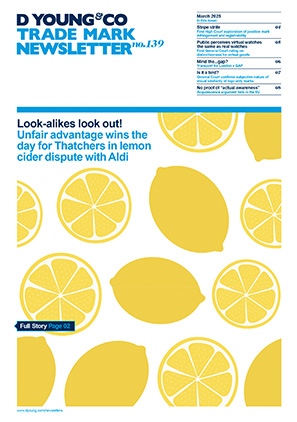Amended German trademark law in force 14 January 2019
The Trade Mark Law Modernization Act (MaMoG) was executed and published in the Federal Law Gazette (Bundesgesetzblatt) on 11/14 December 2018 and will enter into force on 14 January 2019. The Act contains revisions whose aim is to mainly transfer the provisions of EU Trade Mark Directive 2015/2436 of 16 December 2015 into German law. Most changes will have an immediate effect.
Like in most other EU member states, the amendments will not fundamentally change the German trade mark law system. However, there are certain amendments which we deem relevant for trade mark owners:
Changes regarding term of protection and renewals
- The term of protection for trade marks registered on or after 14 January 2019 will end exactly ten years after the filing date and not, as before, ten years after the end of the month in which the trade mark was applied for.
- This does not apply to already registered trade marks.
Determinability of trade marks/new types of trade marks
- A sign needs to be unambiguous and clearly identifiable, but there is no need to be capable of being represented graphically anymore.
- Application of sound marks, multimedia marks, holograms and other types of trade marks in suitable electronic formats is possible (but these marks may not serve as a basis for an international mark as WIPO still requires a 2D representation).
Certification mark
- Introduction of a national certification mark as a new category (besides trade marks and collective marks).
- Extension as an international mark is possible.
New absolute grounds for refusal
- Protected geographical indications and protected designations of origin (especially for foodstuffs, wines and spirits protected under national or European legislation or agreements), protected traditional terms for wine, traditional specialities guaranteed with regard to foodstuffs and protected plant variety denominations.
Third party observations
- Introduction of this option (like with EUIPO).
- Observer does not become party of the proceedings.
Cancellation proceedings
- Renamed as revocation/invalidity proceedings.
- Fee changes.
- Administrative invalidity proceedings before the DPMA (German Patent and Trade Mark Office) will also deal with relative grounds for refusal (earlier rights) as of 01 May 2020 (ie, no separate court proceedings required, but still possible).
- Third party intervener possible.
Many changes in the opposition proceedings
- One opposition with various prior rights possible instead of multiple oppositions of which each is based on one right.
- More options for basis of opposition (now including protected geographical indications and protected designations of origin, etc).
- Change of fee (250 EUR per opposition based on one right plus additional 50 EUR for each additional right, instead of 120 EUR per opposition/right in the past).
- Introduction of a “cooling-off” period (two month, extendable by a joint request of the parties).
- Abolishment of the second objection of non-use with the “moving period”.
- Full evidence required for genuine use instead of prima facie evidence, but affidavit (affirmation in lieu of an oath) is still considered suitable means of proof.
- Different time period relevant for genuine use in opposition proceedings: it will begin five years before the filing date or the priority date of the challenged trade mark, instead of the five years before the date of publication of the registration of the challenged trade mark.
- Grace period for non-use will commence on the date when no further opposition can be filed against the registration of a trade mark (ie, either the day after expiry of the opposition period or the date on which the decision which concluded the opposition proceedings becomes final or the withdrawal of the (last) opposition). So far, the grace period for use began upon publication of the registration or – if an opposition was filed against the registration – at the date when the opposition proceedings were concluded. In future, the beginning and the end of the grace period for use will be recorded in the Trade Mark Register.
These changes will also apply to oppositions within the framework of the procedure for the extension of protection of international registrations of marks to the territory of Germany.
Licenses
- Registrability of licences possible, but not mandatory (subject to a fee).
- Register entry about willingness to license or sell/transfer possible.
Reclassification abolished
- If the division into classes of goods and services is altered after the filing date, the classification will not be adjusted upon renewal of the trade mark, neither at the request of the proprietor nor ex officio.
Goods in transit
- Identical goods in transit can now be stopped by customs.
This is a short overview of amendments which we believe to be most relevant for trade mark owners, but there are also numerous smaller changes which might be relevant in individual cases. For further information please contact your usual D Young & Co trade mark advisor.
DPMA press release - MaMoG
The DPMA (German Patent and Trade Mark Office has published further information about the MaMoG (Trade Mark Law Modernization Act - Markenrechtsmodernisierungsgesetz).
Read more
